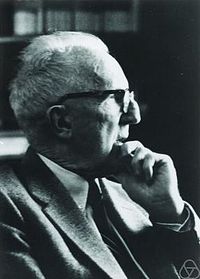M. Morse
| H. C. Marston Morse | |
|---|---|

Morse in 1965 (courtesy MFO)
|
|
| Born |
March 24, 1892 Waterville, Maine, U.S. |
| Died | June 22, 1977 (aged 85) Princeton, New Jersey, U.S. |
| Nationality | American |
| Alma mater |
Colby College Harvard University |
| Known for | Morse theory |
| Awards |
Bôcher Memorial Prize (1933) National Medal of Science (1964) |
| Scientific career | |
| Fields | Mathematics |
| Institutions |
Harvard University Institute for Advanced Study |
| Doctoral advisor | G. D. Birkhoff |
| Doctoral students |
Gustav Hedlund Sumner Myers Arthur Sard |
Harold Calvin Marston Morse (March 24, 1892 – June 22, 1977) was an American mathematician best known for his work on the calculus of variations in the large, a subject where he introduced the technique of differential topology now known as Morse theory. The Morse–Palais lemma, one of the key results in Morse theory, is named after him, as is the Thue–Morse sequence, an infinite binary sequence with many applications. In 1933 he was awarded the Bôcher Memorial Prize for his work in mathematical analysis.
He was born in Waterville, Maine to Ella Phoebe Marston and Howard Calvin Morse in 1892. He received his bachelor's degree from Colby College (also in Waterville) in 1914. At Harvard University, he received both his master's degree in 1915 and his Ph.D. in 1917.
He taught at Harvard, Brown, and Cornell Universities before accepting a position in 1935 at the Institute for Advanced Study in Princeton, where he remained until his retirement in 1962.
He spent most of his career on a single subject, titled Morse Theory, a branch of differential topology. Morse Theory is a very important subject in modern mathematical physics, such as string theory.
Marston Morse should not be confused with Anthony Morse, famous for the Morse–Sard theorem.
...
Wikipedia
